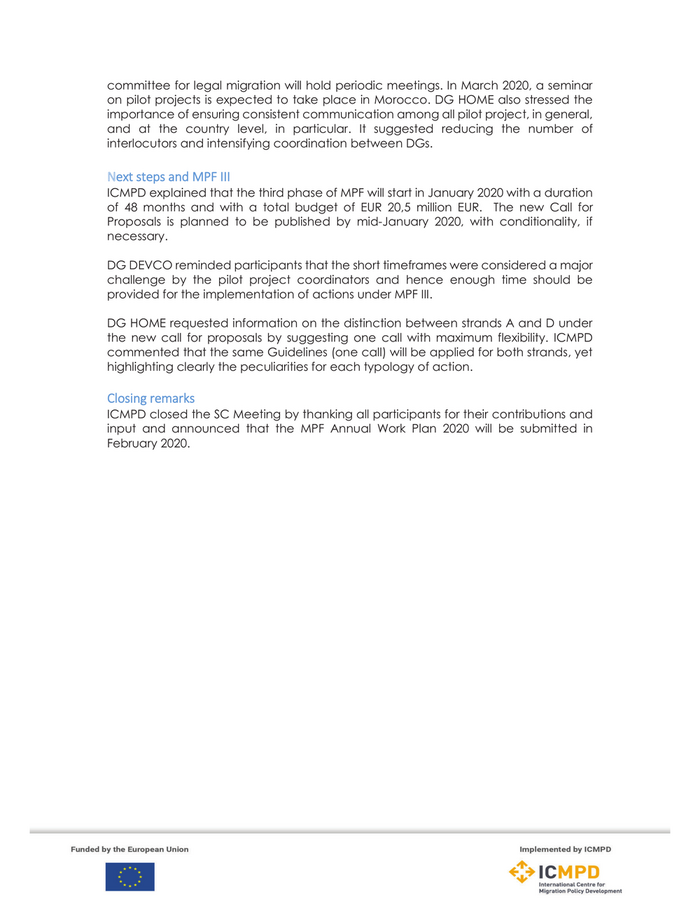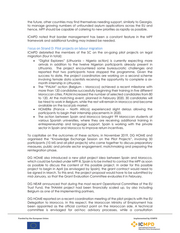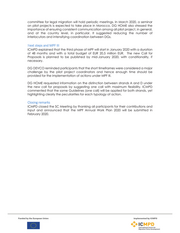mpf-8th-sc-meeting-dec2019-final-redacted
Dieses Dokument ist Teil der Anfrage „correspondence ICMPD“
Ref. Ares(2022}4695430 - 27/06/2022 Eighth $teering Committee Meeting 13 December 2019, 10.00 - 13:00 Draft minutes Funded by the European Union Implemented by ICMPD » Es <>ICMPD f jon Policy Development

Deputy Head of Unit, DG HOME (A3) International Relations Officer, DG HOME (A3) Legal Officer, DG HOME (C2) Programme Assistant, DG HOME (EA) Policy Officer - Centre of Thematic Expertise on Migration, DG NEAR (DGA2.B.TF1) European External Action Service - Secretariat- General - Service of Deputy Secretary General for economic and global issues - Human rights, global and multilateral issues - Migration and human security (GLOBAL.4) Programme Manager, DG DEVCO (B3) CMEPD / Secretariat of the Steering Committee: Director, Head of Brussels Mission, ICMPD Deputy Head of Brussels Mission, Head of Resources Management Brussels, ICMPD Du Head of Global Initiatives Programme, ICMPD Regional Coordinator, Prague Process, ICMPD MPF Project Officer, ICMPD MPF Project Officer, ICMPD MPF Project Officer, ICMPD Resource Management Officer, ICMPD MPF Intern, ICMPD Funded by the European Union Implemented by ICMPD E33 International Centre for Migration Policy Development

Outcome of the discussion Opening remarks ICMPD extended a warm welcome to all the participants to the 8th MPF Steering Committee Meeting, which was an opportune occasion to review several years of implementation and to assess the evaluation of five MPF actions. While, in 2019, there was a focus on the pilot projects on legal migration, there remain other important features that fall under Strand A and B1 of the MPF. The MPF has proven its effectiveness and efficiency since its inception vis-à-vis the EU institutions, EU Member States (EU MS) and the partner countries. The example of the recent action between France and Georgia shows that the MPF is a flexible instrument that allows the EU and EU MS to quickly respond to migratory challenges and emerging political priorities. DG HOME noted that while the EU is undergoing a phase of institutional changes, it is clear that the MPF is an useful and quick-reaction tool to identify and address key priorities in the field migration policy at the EU level. The new European Commission (EC) is currently touring the European capitals to enter a dialogue with MS on a wide range of issues, including on migration. It can already be mentioned that the external dimension of the EU migration policy, a comprehensive and measured approach with third countries and finding a balance between migration and development will continue to feature prominently on the agenda of the new EC. Based on their previous success, DG HOME would consider scaling up the pilot projects on legal migration, also funded under MPF. In terms of policy focus, the new EC will strongly focus on integration, legal pathways and labour migration. Updates on the Prague Process (PP) The PP Secretariat provided an update on the PP’s achievements, focusing on the Work Plans 2019 and 2020 and the key publications produced throughout 2019. Overall, the PP continues to deliver its activities in line with its political mandate. In 2019, the main highlights included: x a training workshop in Kiev on border management x a study visit in Nuremberg, Germany x a 2-3 month internship programme x a summer school co-organised by the PP and Georgian partners involving 100 students and junior migration officials x further training workshops and international conferences. In 2020, the PP Work Plan will include a workshop on migration policy development in Minsk, a lunchtime lecture on the PP in Brussels with the aim of presenting and promoting the work of the PP Migration Observatory, another internship cycle and a study visit to EU MS. Moreover, the Chair of the PP has recently been invited to partake in a conference in Baku to be organised by the United Arab Emirates (UAE), which as the new Chair of the Global Forum on Migration and Development (GFMD) expressed interest to establish cooperation with the PP. The rationale behind this possible collaboration derives from the fact that the UAE see the potential in improving the current set-up of the GFMD and consider therefore to introduce structural changes by also involving regional processes under the Forum. DG HOME commented that the EU has met with the UAE to discuss common areas of interest, such as labour migration from Asian countries, and emphasised the need to

effectively shape the EU-UAE cooperation in terms of interests, budget and financial support. It further noted that any planned events should be in line with the EU’s rationale and interests. For further clarifications in relation to the request from UAE, the PP strategic plan will need to be shared with DG HOME and a decision will be taken later. The PP Secretariat mentioned that the Process was envisaging an expertise-sharing workshop on combatting irregular migration in Russia, based on an expression of interest by its MS (Hungary and Lithuania) and originated within the Secretariat. DG HOME explained that EU-Russia relations exist at the technical level, whereby interventions occur only when the EU has a proven interest and the organisation of a possible meeting in Russia requires increased vigilance, further reflections/discussions and approval by DG HOME. Consequently, DG HOME requested that the idea of conducting an workshop in Russia is to be put on hold until further notice. As far as the current debates on the PP Chairmanship are concerned, it was mentioned that the current Chair, Lithuania, is willing to hand the Chairmanship over after having accepted it from Poland in 2018. Unless the Czech Republic agrees to take it over, there may be a collective Chairmanship, as Hungary has not expressed interest and Poland had already chaired the Process multiple times, in the past. DG HOME noted that the Khartoum Process follows a clear schedule and strategy on Chairmanship. It further stressed that a Process should be a result of political will of all participating countries and that future engagement should be considered in terms of sustainability and degree of involvement. Likewise, DG HOME suggested sharing management responsibilities of the PP Ministerial Conference in 2022 with the potential use of the AMIF funds to cover the organisational costs. It stressed the need to revisit the idea behind the high-level conference in terms of content and planning and encouraged the reflection on the possibility to co-finance it. With the EC launching the consultation phase with EU MS for the next financial instruments and the new AMIF Regulation being released soon, MS should be able to come up with concrete ideas to the planning exercise, in relation to the next Multiannual Financial Framework (MFF) of the EU. On a general note, a more nuanced reflection on the future of the funding instruments is desirables, including with the EU MS, in view of forging a longer-term perspective on how to fund, among other things, the external dimension of the EU migration policy. In relation to the overall PP’s activities, DG HOME stated that the Process is expected to reduce the number of yearly events from 4-5 to a maximum of two to ensure their timeliness and relevance. Seventh Interim Report ICMPD presented the outcomes of the evaluation of five MPF grants (under strand A) carried out by PMG Analytics. The five selected grant contracts, subject to evaluation, focused on various thematic pillars and implemented both in the Southern and Eastern Neighbourhood. PMG Analytics used traditional evaluation criteria by paying particular attention to the actions’ impact on the ground. The evaluation report offers insight into key opportunities and challenges to be considered for the next MPF actions.

Opportunities: - Targeted nature of the actions, focusing on concrete priorities and objectives of the EU, partner countries and the EU MS. - Relevant contribution to EU MS bilateral agendas with the partner countries. In this respect, the MPF actions, for example, contributed to the implementation of a series of bilateral agreements between MS and partner countries (e.g. Italy – Tunisia, Italy – Moldova, Latvia – Belarus, etc.). - The MPF provides added value to the EU as a whole. There is a solid link between the MPF actions and the EU operational and political priorities. - The piloting or innovative approach of the granted actions has strong potential (e.g. the Moldova-Italy action) for replication and sustainability. - The MPF has an institutional impact, having improved coordination among institutions (nationally, bilaterally) and generated more partnerships. Challenges: - The overall timeframe of MPF I Delegation Agreement of 36 months was considered too short. Despite prolongation, it impacted the logical frameworks of the individual actions, limiting MS ability, for instance, to better assess the needs of the project beneficiaries, to prepare the reception phase or to conduct research for the reintegration phase. - It is necessary to improve the services provided to direct beneficiaries, especially upon return to the country of origin. - MS are expected to create and increase synergies with other EU-funded actions in the future. - MS have different levels of project management experience and are advised not to rush implementation (Lithuania, for instance, tested its project management capacities via the MPF action). To mitigate this aspect, ICMPD started recently addressing this challenge by organising training session for the EU MS implementing actions during the inception phase of each action. - Capacity-building components should be more targeted and focused (e.g. the training component was merely theoretical within the framework of the Lithuania – Moldova action). DG HOME requested further information on the evaluation methodology and any key insights relevant specifically for the EU. ICMPD noted that while the overall institutional setting in Eastern European countries is robust, the MPF action in Armenia (carried out by Sweden) proved to be innovative for the institutional structure in place. In practice, therefore, the Armenian counterparts were not fully equipped to manage the project effectively and absorb its outcomes. On the same vein, the institutional capacities in Morocco and Tunisia, were not sufficiently strong in relation to implementation of the mentorship scheme put in place by Italy under the MENTOR action (for instance when it comes to the recruitment cycle) revolving around legal migration. DG HOME stressed the need to continue the engagement with the MPF partner countries such as Morocco and Tunisia and to explore the possibility of upscaling the pilot project on legal migration. It further noted that in the context of the DG NEAR’s Project “Towards a Holistic Approach to Labour Migration Governance and Labour Mobility in North Africa” (THAMM), it is crucial to ensure project effectiveness, coordination, close cooperation and sustainability.

On a final note, ICMPD noted that the evaluation report concludes that the partners consider the instrument particularly useful due to its flexibility and quick reaction. MPF Webpage ICMPD presented the recently launched MPF webpage aiming to boost the overall visibility of the Facility and to better disseminate information on the Facility’s activities and results. The FAQ section will be updated with details on MPF III once the next call for proposal will be launched. Furthermore, the webpage will be linked with the MPF online scoreboards platform for improved usability. DG HOME emphasised the long-existing need for an MPF webpage and suggested making it as user-friendly as possible, for instance, by adding photos to complement already existing visuals. ICMPD further explained that the online Mobility Partnerships’ Scoreboards Platform will allow its users (EC, MS, partner countries, etc.) to input relevant information in one place and harmonises different versions of the scoreboards used by institutions and MPF partner countries alike. An introductory training was conducted for officials from Georgia and Moldova in order to test the usability of the platform. The next step involves uploading and updating the information on the platform, presenting it to relevant actors (EC, EU MS, partner countries), as well as making it a living instrument with input to be provided by the signatories of the joint declarations of the Mobility Partnerships. ICMPD will propose a way forward to DG HOME. DG HOME stated that access is limited to registered users and yet provides a useful source of information for policy-making and programmatic purposes. It also noted that meetings on the development of the database were conducted throughout 2019 and suggested the establishment of a proper mechanism that would allow for effective management of the database, particularly in terms of access, role of users, information feeding, input, updates and data provision, as well as monitoring. ICMPD reminded the members of the SC that the platform is one of the elements of the so-called architecture of the MP which also includes local cooperation platforms and high-level meetings that are currently on hold. It will be important to also present the platform to these structures, once their functioning is relaunched. Financial Overview of the Grants x MPF is currently running nine actions under strands A and D (the full list was provided in the PowerPoint Presentation) x One B1 Actions is ongoing (Belarus) and another one (Jordan) was approved and will start once the MPF III contract is signed x The remaining balance under the ISF Police, under MPF II, was EUR 526,463.30. DG HOME highlighted that the two most recent grants fall under the ISF-Border fund and it recognised the increasing trend of working on border issues, as emerging priority, and this fact will need to be further considered, also when it comes to the (limited) volume of funds allocated via MPF III in relation to border-related issues. It emphasised that in the case of the action between France and Georgia, the MPF has proven to be a very important and flexible tool, especially in terms of political engagement with Georgia (helping it to fulfil benchmarks under visa liberalisation). In

the future, other countries may find themselves needing support, similarly to Georgia, to manage growing numbers of unfounded asylum applications across the EU and hence, MPF should be capable of catering to new priorities as rapidly as possible. ICMPD noted that border management has been a constant feature in the MPF framework and additional funding may indeed be needed. Focus on Strand D: Pilot projects on labour migration ICMPD debriefed the members of the SC on the on-going pilot projects on legal migration (four in total): x “Digital Explorers” (Lithuania – Nigeria action) is currently expecting more arrivals in addition to the twelve Nigerian participants already present in Lithuania. The project encountered some bureaucratic challenges and reported that two participants have stopped the programme. Given the success to date, the project coordinators are working on a second scheme involving female data scientists receiving the opportunity to complete a six- month internship in Lithuania. x The “PALIM” action (Belgium – Morocco) achieved a recent milestone with more than 120 candidates successfully beginning their training in five different Moroccan cities. PALIM increased the number of selected candidates from 80 to 120. At the matching event, planned in February 2020, 30 candidates will be hired to work in Belgium, while the rest will remain in Morocco and become available on the local job market. x HOMERe (France – North Africa) experienced slight delays allowing the participants to begin their internship placements in 2020. x The action between Spain and Morocco brought 99 Moroccan students at various Spanish universities, where they are receiving additional training in entrepreneurship and language support. Spain is working with the private sector in Spain and Morocco to improve return incentives. To capitalise on the outcomes of these actions, in November 2019, DG HOME and organised the “Knowledge Exchange Session on the Pilot Projects”, involving 50 participants (10 MS and all pilot projects) who came together to discuss preparatory measures, public and private sector engagement, matchmaking and preparing the reintegration phase. DG HOME also introduced a new pilot project idea between Spain and Morocco, which could be funded under MPF III. Spain is to be invited to contact the MPF as soon as possible to discuss the content of this possible project. In order for this possible project to begin in April (as envisaged by Spain), the grant contract would need to be signed in March. To this end, the project proposal would have to be submitted by mid-January, so that the Grant Evaluation Committee evaluates it in February. DG NEAR announced that during the most recent Operational Committee of the EU Trust Fund, the THAMM project had been financially scaled up, by also including Belgium as one of the implementing partners. DG HOME reported on a recent coordination meeting of the pilot projects with the EU Delegation to Morocco. In this respect, the Moroccan Ministry of Employment has been appointed as the official contact point on the Moroccan side. A technical committee is envisaged for ad-hoc advisory processes, while a consultation

committee for legal migration will hold periodic meetings. In March 2020, a seminar on pilot projects is expected to take place in Morocco. DG HOME also stressed the importance of ensuring consistent communication among all pilot project, in general, and at the country level, in particular. It suggested reducing the number of interlocutors and intensifying coordination between DGs. Next steps and MPF III ICMPD explained that the third phase of MPF will start in January 2020 with a duration of 48 months and with a total budget of EUR 20,5 million EUR. The new Call for Proposals is planned to be published by mid-January 2020, with conditionality, if necessary. DG DEVCO reminded participants that the short timeframes were considered a major challenge by the pilot project coordinators and hence enough time should be provided for the implementation of actions under MPF III. DG HOME requested information on the distinction between strands A and D under the new call for proposals by suggesting one call with maximum flexibility. ICMPD commented that the same Guidelines (one call) will be applied for both strands, yet highlighting clearly the peculiarities for each typology of action. Closing remarks ICMPD closed the SC Meeting by thanking all participants for their contributions and input and announced that the MPF Annual Work Plan 2020 will be submitted in February 2020.








